#asoiaf religion
Explore tagged Tumblr posts
Note
People who see the dragons as nukes who must die are completely misinterpreting the story. Let’s apply this analysis to the books though. Does Daenerys receive 3 deactivated nukes as a gift in her wedding day ? Does she press a nuke against her pregnant belly and the chemicals inside of it reach out to her unborn child ? Does she lay 3 nukes in her husband’s funeral pyre to honor him ? Does she lovingly hold and breastfeed 3 nukes ? Does Jon Snow wish that he had a nuke to fight off the freezing cold ? Does Arya consider nukes to be her friends ? Does young Tyrion beg his uncles for a nuke so he can be less lonely ?
Dragons aren’t single purpose objects, they’re living, thinking, breathing creatures, and Daenerys specifically views them as such, she literally thinks of them as her children. Historically, the dragons were essentially enslaved by the blood bond and the problem was that they were used by people who viewed them as weapons first and foremost. Daenerys (a character who is extremely invested in liberation by the way) being mother of dragons, specifically, as in giving them life and literally nursing them herself, is meant to show how her relationship to the dragons is unique from her ancestors. They aren’t just a bunch of flying weapons to her.
Dragons are the living embodiment of a primordial natural magical force (fire), and their extinction was caused by misogyny, human ambition, greed, and by people in the story doing exactly what the “dragons are nukes” crowd does, which is look at them as just Big Weapon (e.g. Aemond and Daeron), and said extinction is heavily implied to be the reason winters are getting harsher (“the summers have been shorter since the last dragon died, and the winters longer and crueler”, “the real enemy is the cold”). Calling them nuclear weapons is wayyyy missing the point. It was the greater Valyrian sin of trying to control and dominate nature/magic and bend it to their whims that lead to chaos (hello The Doom and hello Valyria Fanboy Euron), which manifested in the dragon lords like the Targaryens as them controlling dragons, but “dragons are nukes” flattens the theme and misses the forest for the trees, and it’s why you get absolutely mind numbing takes like “yeah George brought back the dragons after centuries of extinction just to kill them all off again after two years in existence because Magic Bad”.
I talked about dragons, their symbolism, etc. HERE.
George at one point did compare dragons to nuclear "deterrents" when he speaks about Dany being the most powerful person in the world in 🔗a Vulture article:
When civilizations clash in your books, instead of Guns, Germs, and Steel, maybe it's more like Dragons, Magic, and Steel (and also Germs). There is magic in my universe, but it's pretty low magic compared to other fantasies. Dragons are the nuclear deterrent, and only Dany has them, which in some ways makes her the most powerful person in the world. But is that sufficient? These are the kind of issues I'm trying to explore. The United States right now has the ability to destroy the world with our nuclear arsenal, but that doesn't mean we can achieve specific geopolitical goals. Power is more subtle than that. You can have the power to destroy, but it doesn't give you the power to reform, or improve, or build.
and GRRM does bring it up to express that dragons are so destructive that one can't use their fire for everything, for every problem when it might spell so much disaster. I think you can use dragons more often if the situation will not spiral out of control--Dragonfire does not persist when one attempts to put it out (like with wildfyre) so its destructiveness is not in the exact same scope or horror as a radioactive nuclear missile that can leave behind radiation/devastation for years afterward...nor does it have the sort of reach these modern weapons have.
Dragonfire remains relatively within tighter confines of its targets unless you got really dry ground and don't put it out in time. The reason why dragonfire is compared to nuclear warfare is because like nuclear weapons now in the real digital-age, modern world, for the world it exists in dragonfire is the most powerful possible weapon of war.
It's about how Dany or anyone uses and regards dragons and others' own conceptions of magic and strength/danger that will make/break how they will perceive dragons. Not that dragons are innately evil; you sound like an overly superstitious and hypocritical Seven septon/over zealous Christian that way.
#asoiaf asks to me#asoiaf dragons#daenerys stormborn#daenerys targaryen#daenerys stormborn's characterization#the evil targaryens#asoiaf articles#defending Daenerys Stormborn Khaleesi Targaryen#asoiaf religion#asoiaf#agot#asoiaf symbolism#asoiaf fire symbolism
79 notes
·
View notes
Note

The Faith of the Seven is the origin and guide of many values in Westeros and it is the means by which to affirm its patriarchal structure through ideals of masculinity and womanhood. And it is a huge informant of the dynamics between the identities b/t man-woman, lord-vassal, the gods-humans, humans-animals as a black-and-white binary of ruler/source-subaltern/inferior (those who are recognized as having autonomy and authority over others versus those who live to serve & upkeep those with authority).
Criston is a warrior sworn to only the Monarch of the realm (protect them & those they are tasked to protect, keep their secrets, obey them, etc.) and part of the values Westerosis have is female submission and all that entails it maritally, military wise, etc. Andal, chivalric warrior tradition is to "protect" the ill, children, women and though protecting the vulnerable is necessary and important, part of how womanhood facilitates masculinity in Westeros is that a woman does not question or challenge much of masculinity. Rhaenyra does so by refusing to run away with Cole, who seeks to use marriage vows & them running off together to "restore" his own sense of honor while completely ignoring how this would destroy hers in the process. Patriarchy is the constant moving of goalposts to center the priorities and desires/needs of men. This is why he considers Rhaenyra a "whore" both in show and in the book. A "whore" or a "slut" is always a woman who refuses to limit/submit their body and their entire selves as a device for others sexually/reproductively.
So I disagree with the idea that sexism/misogyny is not why Cole hates Rhaenyra, since the point/root reason behind all this:
self-loathing that he projects onto Rhaenyra because it's easier than having to sit with his own guilt, so I suspect some of that does remain to him. His broken honor is something that can never be repaired, not entirely, (because he did do it. He broke his oaths, he sullied his honor, and he remains in the Kingsguard where that black mark must always be in the back of his mind) and I think on some level he is painfully aware that his honor cannot be repaired in its entirety and he hates that. Alicent provides him with a new oath, a way to redirect his fervency, a willing stand-in for the kind of relationship he wanted with Rhaenyra
is that he must put blame on the person who is not at fault for his own decision of choosing to break his own vows. It has to be Rhaenyra/a woman specifically bc said woman refused to give up her entire life just so he can feel better about a decision he made...instead of accepting that she wanted to do as many other men have already done: keep a side lover while ruling or anticipating rule and married for political alliance.
His "self-loathing" stems from his not being able to leverage his false victimhood against Rhaenyra, as that is the primary value of masculinity and being a warrior, which itself is masculinized in Westeros. He can't do so or force her bc Rhaenyra's being used to affirm Viserys' determination to make up for his own false prophesizing and use of Aemma for said prophecy/prophetic beliefs in needing a male heir. Viserys, the King, i.e., the highest "secular" authority and his direct "boss".
Rhaenyra has the protection/edge--unlike other women and girls if Cole had done the same to them--of her heirship/father/class. And she refuses to give up that edge not even some lord's daughters have when it'd be more convenient for Cole for her to do so.
With Alicent--who though the queen Consort also gives up much of her own possible powers (or what she can make of them, as bk!Alicent does often) to further Otto's both consciously and unconsciously--he's back to fighting for a "worthy" woman who herself is seeking to "restore" female submissiveness to a traditional, patriarchal (these are one and the same in Westeros, they can never be not) sociopolitical imperative: males determine female bodies' movements, purpose, etc. Politics and psychology are not unreciprocated, totally independent, mutually exclusive, un-informing, separate entities.
Alicent wishes to reinstate the feudal in order to feel as if she gets something out of the "deal" feudal patriarchy foisted onto her and other women. For her, he at least gets to be recognized as one who helped men to reinstate that power, thus she can finally be validated. (duty and sacrifice), and more than Aegon becoming king, it is about not letting a woman rise above the state of "second place" or her "natural" state as being the dependent/subject of/governed by/obedient/subordinate/attendant/collateral/secondary to/at the mercy of "man".
So yeah, Alicent "saved" Cole, bc Cole IS this need to subordinate women for this particular misogynist order that he inevitably bases his own worth on...that his vows he doesn't think critically about will always be based on.
do you think criston is still ridden with guilt even 10 years later for losing his virginity/honor or did he reclaim that when alicent granted him mercy and a new purpose but even now 10 years later that regained sense of chivalry and honor is somehow twisted by his misery/hatred for rhaenyra?
Oh anon, this is the juiciest of questions, thank you so much for asking.
I think on some level, his intense hatred of Rhaenyra has to stem from his sense of broken honor (and figurative loss of virginity), doesn't it? What I think is often missed in interpretations of his character is how much of it is self-loathing that he projects onto Rhaenyra because it's easier than having to sit with his own guilt, so I suspect some of that does remain to him. His broken honor is something that can never be repaired, not entirely, (because he did do it. He broke his oaths, he sullied his honor, and he remains in the Kingsguard, where that black mark must always be in the back of his mind) and I think on some level he is painfully aware that his honor cannot be repaired in its entirety and he hates that. Alicent provides him with a new oath, a way to redirect his fervency, a willing stand-in for the kind of relationship he wanted with Rhaenyra (sans quite as much romantic longing, I think, if only because he's been burned once and I doubt he wants to be again). She provides a shield of moral superiority, yes, but there is no way to repair what he had already done.
So, I suppose at the end of the day, Criston is so bitter because of this inner awareness that his newfound honor and moral superiority is a lie. And, in his mind, Rhaenyra made a liar out of him.
(As an addendum: I really do think one of the reasons, beyond guilt, that he's so bitter still is both because he's in the same castle as Rhaenyra (where they have to see each other) and also because he's close friends with Alicent. They both hate Rhaenyra, are forced into proximity with Rhaenyra, and undoubtably have radicalized each other's hatred of her over a ten year period. I think his guilt and misery over breaking his oath is the originating factor of his hatred but--have you ever had to be around someone you already didn't like? Because you will hate everything they do, even the stupid little things that don't matter. And ten years is a long time to let a hate like that fester into rot).
#criston cole's characterization#criston cole#hotd characterization#westerosi society#faith of the seven#westerosi religion#asoiaf religion#asoiaf knighthood#asoiaf#hotd
46 notes
·
View notes
Text

Septon Meribald’s statement here strikes me as getting at something intrinsic to the essence of sacrifice in ASOIAF. A sacrifice's power comes from its voluntary nature. Seems like an important point in a world where so many religions practice human sacrifice.
249 notes
·
View notes
Text
No, but seriously, how lucky was House Targaryen to have Maegor? RIP Aegon and Viserys, obviously, but think about it. Aegon conquered six of the seven kingdoms and "unified" them under his control, but the Faith Militant were the one thing you never want as an absolute monarch: a large, independent military force tied to the "state" religion.
Not only did Maegor (and Visenya, let's not discount her contributions) entirely dismantle that threat, they established their control over the Faith and gave the realm several reminders of just how much it sucks to have even one dragon breathing fire down upon your holdfast.
All of which made Jaehaerys's life so much easier when he came to power. He got to be the "Conciliator", the reasonable Targaryen, the example of "see? absolute monarchs can keep things running smoothly." While leveraging the memory of Maegor's threat to secure the Doctrine of Exceptionalism as a way for the Faith to save face. "Targaryens are just special, everyone else has to follow the old rules."
(There are many other ways in which House Targaryen lucked into having some good reigns after never having ruled at a kingdom level, of course, but that's for another post.)
#resonant lore#(not really resonant lore but i don't have a good tag for general asoiaf meta)#one thing that worked out fairly well for the iron throne and house targaryen imo was that they WERE outsiders#aka if any of the existing kings had taken power there would have been old struggles/bad blood and favoritism toward the “main” kingdom#whereas the targaryens had never been kings; they jumped straight there but didn't have any baggage#and had happily already adopted the general customs/religion of the neighboring kingdoms
64 notes
·
View notes
Text
genuinely so awesome and interesting how alicent’s politics are motivated by the rigidity of her worldview and the amount she really really truly believes in the rightness of the oppressive social order she is trapped in + the faith of the seven. and then her dad Otto, the de facto leader of the whole team green political faction, just does not believe in any of that shit at all except that it’s good optics. literally no real principles except acquiring and consolidating power.
#nominating rhaenyra for king as a chess move…#indoctrinating your child into a religion you don’t give a fuck about because it’ll pay off politically#asoiaf
466 notes
·
View notes
Text
she mad at her husband😑
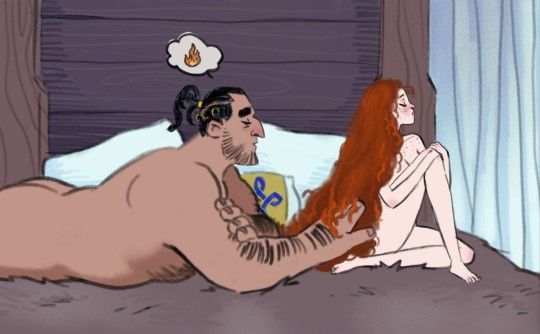
I've got a few words with other people who, like me, are fascinated with GRRM's writing and characters :) Apparently it's *trendy* to dunk on this ship and bully its shippers these days. It's beyond me why we should fight over every little silly thing. First and foremost, a Song of Ice and Fire is a hobby for me, and many others, and it should be treated as such. It should not affect our real life in a negative way. If you care immensely about lives of fictional characters to an extent that you find online bullying and insulting others for no real reason a 'moral' thing to do, I am seriously worried for you. It speaks of a certain immaturity when there are real problems in the world, when real people are being hurt, killed, thrown out of their houses, deprived of their human rights, etc, and some people here spend their lives fighting over some non-problems.
Sorry to rant, anyway, good day to everyone 💙
#viking au#asoiaf#sansa stark#sandor clegane#vikings#nuns#a song of ice and fire#also a little rant because i see people turning a hobby into an aggressive religion and that's unsettling#sansan
229 notes
·
View notes
Text


#alicent hightower#olivia cooke#house of the dragon#hotd#got#game of thrones#asoiaf#a song of ice and fire#queen alicent hightower#on religion#on god#anger#web weaving#mine#on anger#quote#angry at god
54 notes
·
View notes
Text
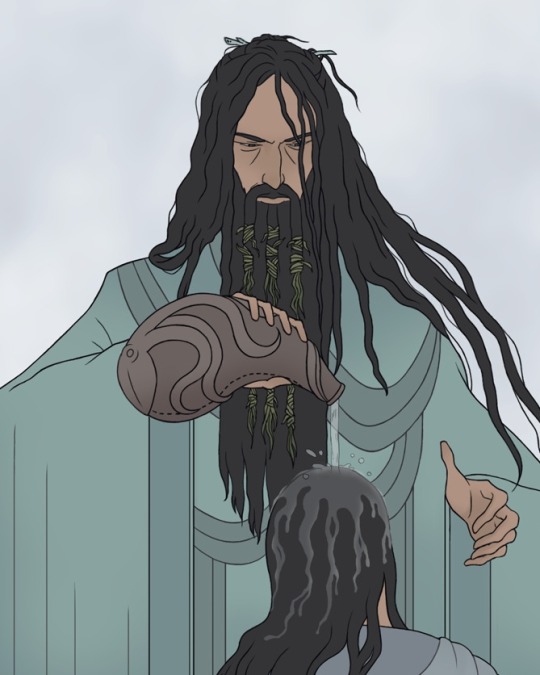
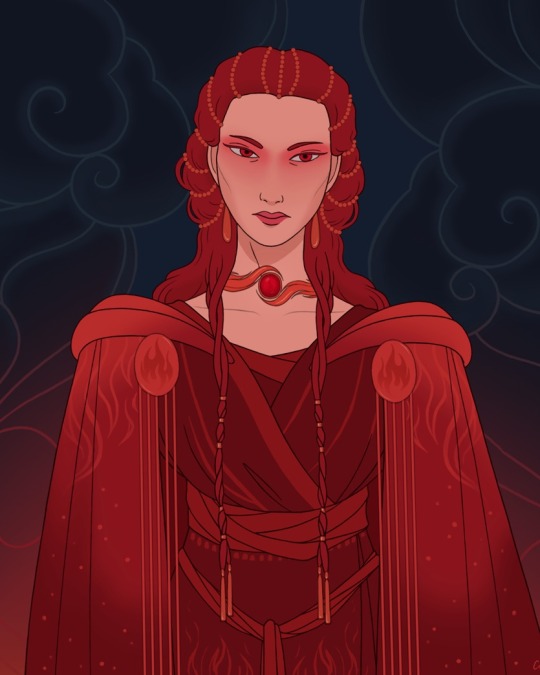
Interviewer: How real are the gods in the world of Westeros?
George: Well, how real are the gods in our world? We don't know. I certainly don't intend to ever bring a god on stage in any of the Ice and Fire books. There's fantasy that does that, but not mine, because of the grounding in realism. We see events happening in the real world that certain people who have a religious belief ascribe to their god or combination of gods, but it's not provable, it could have just been some other explanation. I like that sort of ambiguity and since it occurs in real life, I want to create that ambiguity in my fiction too. So, some of my characters are very cynical about the gods and some others are deeply religious and have a lot of faith. There's Aeron Greyjoy, a priest who follows a deity called the Drowned God, there’s Melisandre who's a priestess of a fire deity called the Lord of Light, and they're true believers, they ascribe everything to the gods. Other characters like Tyrion Lannister are far more cynical about all of this. One of the interesting things about the way I've structured the books is that I have multiple viewpoint characters. It's a tight viewpoint structure where I'm not an omniscient author, I don't tell you the way it really is, I put you in the skin of my characters and you see the world through their eyes. It's all filtered through their own particular worldview and beliefs.
- George R.R. Martin, ABC Conversations with Richard Fidler
#Aeron Greyjoy#Melisandre of Asshai#Tyrion Lannister#Religion#George R.R. Martin#ValyrianScrolls#ASOIAF
158 notes
·
View notes
Note
I read this thread that I found quite interesting if you want to check it out
https://x.com/darksvster/status/1817785978708480244
Rhaenyra is in a way turning into a cult leader a la Paul Atreides, believing herself to be the prince who was promised, recruiting smallfolk who have nothing to lose and sending them to their deaths to fight in her name, its a very prevalent theme actually. The dragon keepers being appalled by the massacre this will cause but her insisting on it, its a descent into self glory and obsession. The more she gets closer to the Iron Throne the more it corrupts her which is why I’m absolutely sure they will include her getting cut as soon as she sits on it. Let’s face it, as much as I hate to admit it, misogyny isn’t a main theme in HOTD.
When I heard Ryan described this scene as cult behaviour and Rhaenyra acting as a “pastor”, my mind went straight to the Shepherd (a strong follower of the Faith of the Seven), they’d be the different sides of the same coin, Rhaenyra brought down these gods, here they slaughtered the smallfolk but at the Storming of Dragonpit, it’s the smallfolk destroying them.
And if you take into consideration that the prophecy was proven false in GOT and how HOTD is trying to hammer down the idea that monarchies and especially Targaryen ones are terrible, it leads you to the idea that anyone who thinks them selves as the savior is a false prophet. Viserys told her about the prophecy to make her pursuit of the throne more legitimate and peaceful, however it ended up making her more unhinged because she now believes herself a prophet when its all a farce, neither she nor her descendants will be the saviors IN SHOW LORE (please don’t misunderstand me, I know that in the books, the prince that was promised and Azor Ahai are Daenerys and no one else).
Didn't watch the episode, so this is pretty helpful and explains a lot why I kept seeing Rhaenys-cult leader in my Twitter timeline. How interesting...
Always remember that Condal came from a Catholic school (I also did but you don't see me trying to make a canonically family/woman who never really had much enthusiasm for religion religiously cultish...)
Rhaenyra never tried to build any sort of cult around herself or dragons
dragons always choose their own rider, so the dragonkeepers protesting Rhaenyra having lowborns have access to dragons is more classism than religiousness still wouldn't make any sense besides bc 1) they'd be going against their dragon-gods' wishes/authority 2) there's no proof of them even coming from Valyrian families... unlike in the orig lore, in the show they seem to be randos who can speak Old Valyrian and have ritualistic practices concerning dragons as literal gods/reps of gods
Old Valyrian dragonlords were never particularly religiously "devoted" or defined themselves through gods even with them having their own gods as they had a multireligious state in Old Valyria....at least comparatively to other peoples, inlcu the andals, who are actually the ones who you'd say were religiously cultish with their carving Seven symbols in their foreheads and later talking something close to Manifest destiny to explain how/why the fled Essos (when it was more liekly bc of the Valyrians)
the dragonkeepers have never in all of history been in the authority to deny a Targ anything based on any sort of separate and independent authority OR religious beliefs bc their role was just to guard dragons/their eggs/their lairs
AND
that he's mainly trying to create a story he's always wanted to see as a fan of GRRM's work (BigThink article):

So, yeah, all this matters for the exact direction you predict and I dislike this concept.
#asoiaf asks to me#ryan condal#rhaenyra targaryen#rhaenyra's characterization#hotd characterization#book vs tv comparisons#hotd writing#hotd critical#hotd comment#hotd#asoiaf#the dragonkeepers#asoiaf dragons#asoiaf religion#old valyria#the valyrians#asoiaf history
38 notes
·
View notes
Text
Targ stans who go on and on about "The blood of Old Valyria" and "filthy Andal blood and traditions" always manage to baffle me when they start talking about religion in Westeros.
Like, High Valyrians with their Valyrian Gods partaked in human sacrifice, human experiments, unimaginable types of torture, slavery, eugenics, all types of familial incest and were basically fantasy nazis in their society built upon the enslavement and forced hard labor of the races they saw as "lesser" but clearly, the evilest religion is the one where people pray to the humanoid aspects of their God and read their bejeweled little book.
#asoiaf#a song of ice and fire#targ stans#at it again#anti targaryen stans#anti targ stans#cut the “blood of old valyria” bs babes#hotd#house of the dragon#old valyria#fuck old valyria#faith of the seven#religion in asoiaf
277 notes
·
View notes
Text
i know that of all the worldbuilding spin off writing, this is probably the least profitable for authors to delve into, but i am super intrigued by fictional/fantasy religions and i would 100% buy worldbuilding books that are only about theology and religious practices (and religious architecture!)
the first things that comes to mind for me are the religions in ASOIAF, The Wicked Years, the Silt Verses, and The Story Must Be Told.
i want to read the seven-pointed-star! give me hymns to the drowned god! i need a lurlinist epic and a treatise on unionist doctrine!! I want to hold the actual siltverses and read an essay about the nature of The Story.
#wicked#the wicked years#wicked book#wicked novel#asoiaf#a song of ice and fire#fantasy#books#the silt verses#tsv#the story must be told#tsmbt#i just love learning about religion in general#and i love learning about fictional lore#so naturally put to two together and im in heaven
35 notes
·
View notes
Text
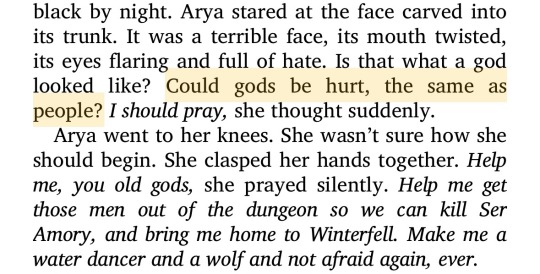
Arya IX, ACOK
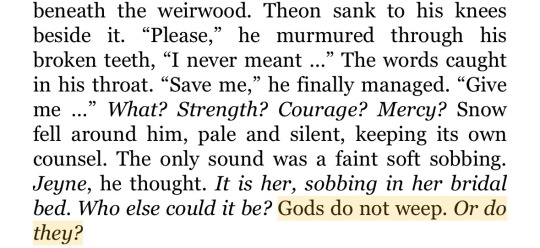
The Turncloak, ADWD
Two prayers.
#asoiaf#theon greyjoy#arya stark#a clash of kings#a dance with dragons#religion in asoiaf#the old gods#the weirwood’s face in harrenhall is full of hate#and the one in winterfell is crying#will there ever be a laughing tree?#doc
106 notes
·
View notes
Text
Alicent settled lightly on his hips. Baelon's bones crunched. His skin scorched with heat. She was a wonder of the world. More mysterious than the walls of Asshai. More satisfying to plunder than the smoking remains of the Great Empire of the Dawn. More fragrant than the sweet gardens of the Reach. Her body was a far better mausoleum than the one he had discovered in the Dothraki wasteland, for in it Baelon could bury himself. More worthy of worship than any temple.
«You make me starve in ways I've never known before, impossible woman.»
He nuzzled his nose into the curve between Alicent's neck and shoulder, her fingers digging into his shoulder, caressing the muscles and outlining the scars. Baelon wished he could turn her into one of them too, carve them into the base of his skull so that even as death devoured his muscles and flesh and very being Alicent would still be with him, mingled with his ashes and his very fate.
Mockingbird [DRAFT] (will be published soon); this stunning commission was done by @gramnel specifically for me.
P. S. Yeah, Baelon loves Alicent. Yeah, Alicent is finally treated good. No, it’s not Aegon in the art. No, it’s not Viserys’s father. It’s literally Viserys’s son from Aemma. Yeah, maybe one day I’ll write a story about Baelon the Brave with Alicent but not today ❤️🩹
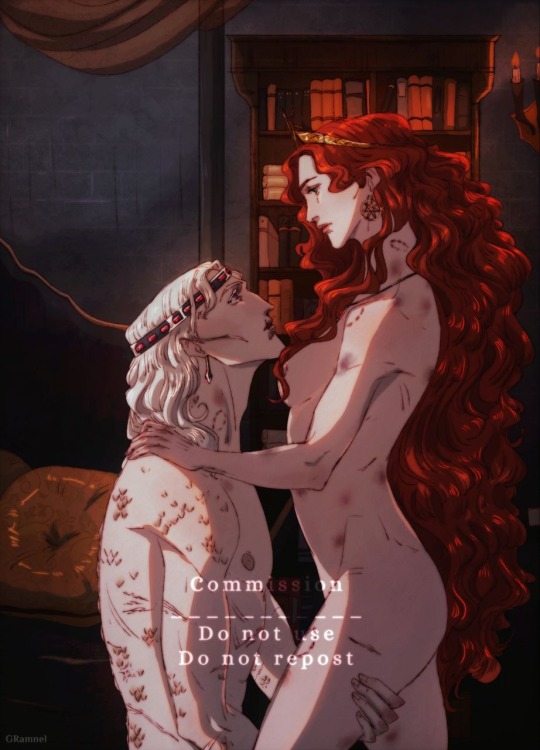
#a song of ice and fire#asoiaf#house of the dragon#hotd#fanfic#alicent hightower#fire and blood#baelon targaryen#baelon x alicent#baelicent#she is his religion#he is her temple#they are my beloved pookies ❤️
24 notes
·
View notes
Note
What do you think of Grrm's portrayal of religion?
Hi anon, this is a really interesting question, and it took me awhile to put together what I hope is a coherent answer.
For context, I think GRRM's background is important to keep in mind. George is almost exactly my parents' age and belongs to the same demographic of American anti-war ex hippies who aged into broadly liberal baby-boomers. Their radicalism has largely mellowed over the years, they may not be the most up to date on the appropriate terminology, and they tend to prioritize nonviolent solutions to systemic problems (my mom often tells me the younger generation needs to do another March on Washington). One thing liberal boomers also tend have in common is that often they grew up religious but, as they entered their 20s and went to college, broke away from the churches of their childhood. My family is full of ex-Catholic liberal boomers like George. They might have dabbled in Buddhism or Hinduism in the 70s, New Age mysticism in the 80s or 90s, and ended up settling into statements like, "I'm spiritual, but not religious." Almost invariably, they have a sort of disdain for organized religion, which they associate with a kind of yokel mentality, a place for anti-Choice anti-LGBTQ traditionalists. Although they will profess "to each his own," to the average liberal boomer, the church represents regressive values and they cannot imagine why anyone would willingly return to it. Even those who did remain religious take great pains to make it known they are not like those Christians. And to be fair, liberal boomers have a good reason to feel this way. The churches of their childhoods were not fun places for people whose own ideas and values went against post-WW2 broadly white middle class values. Unsurprisingly, SFF authors tend to fit into this category.
And this sort of bleeds into a lot of 90s SFF. You see a lot of worlds that have religion, but rarely do you have characters that are religious, and even more rarely do you have sympathetic young protagonists who are religious. You might have the occasional kindly priest or nun type, but far more often these characters will be abusive, mean spirited, or narrow minded (think of Brienne's childhood septas). Religion is often treated with the same disdain by in-world characters as it is by the authors themselves. You might even have worlds that are almost entirely secular, with vague references to "The Gods," but without any real religious traditions constructed around them (Robin Hobb's Realm of the Elderlings series, which features two vague dieties, Eda and El, who seem to have no religious traditions surrounding them whatsoever). You might have cultish religions that are actively dangerous and must be stopped, or you might have Catholic church analogues, existing in opposition to everything cool and fun. Protagonists tend to be cynical non-believer types, or they might start off as true believers and lose their religion along the way. Rarely are they allowed to have sincere and abiding faith.
And you can see a lot of this in George's writing, in the way he portrays the Faith of the Seven and other religions, and the way the fandom receives them. The Faith of the Seven is Westeros' answer to the Catholic church, but there are also the Old Gods, the faith of R'hllor, and others, often presented in opposition to each other. George himself sees religion as a divisive force, and in ASOIAF, we see religions in conflict with each other, we see them weaponized to fuel vendettas, we see them used to drive prophesies and start wars. There's a clip somewhere, of George at a panel, where he's talking about religious conflict and his take is very reminiscent of George Carlin's-- you can tell he knows the bit. "Are you really going to kill all of these people because a giant invisible guy in the sky told you too? And your giant guy in the sky is different?" George asks, receiving a round of applause from the crowd. It's a very modern view on religion, which is fair, I think. He's writing for a modern audience who have modern conceptions of the church, and he is making a deliberate point about the harm religion can do. .
What I do think is missing, or at least downplayed, are the ways in which the medieval church was really a driving cultural and social force in medieval Europe. We live in a secular society, so we have the luxury of disregarding the church in a way that medieval people did not. This is one major way in which the worldbuilding of ASOIAF departs from the real world middle ages. To portray the medieval church as a primarily regressive institution that mostly drove conflict is too simplistic. The Catholic church is what culturally unified most of western Europe into what was known as "Christendom." The clergy served political functions, such as providing an important check upon the power of medieval kings, and when the power of the church declined, despotism grew. Socially, for most western Europeans, the church was also the center of day to day life. Insofar as medieval peasants had any opportunities for leisure time and celebrations, most of these revolved around the church. The church was for centuries a driving force behind art, music, literature, and architecture, and it also performed important social functions, such as operating poorhouses and leper-houses, and providing educations for children.
And all of this was just extremely normal. Most people prayed multiple times each day, and sincerely believed in heaven a hell. The state of one's soul after death was such a real concern that the sale of indulgences-- a way that you could pay to get your dead loved ones whose souls were in purgatory into heaven more quickly-- became a major racket for the Church. I've seen the HotD fandom react to Alicent Hightower's level of devotion calling her a religious "fanatic" and I cannot stress enough how absolutely normal Alicent would have been in medieval times. This is where I blame the framing of the show more than George, because it does set Alicent's faith in opposition to Rhaenyra's seemingly more modern values, but does it in a selective way. For instance, Alicent comes off as prudish, and modern audiences hate a prude, but we never see how her faith would have certainly inspired her, as queen, to take other more progressive actions such as giving alms to the poor or bestowing her patronage upon motherhouses. In another post about the fandom perception of Valyrian culture, I talked about how this modern view of devout belief, particularly Catholicism, tends to cast anything that is presented in opposition to it as an unequivocal good, and I see this sort of rhetoric slung around the fandom a lot, "why would you defend the pseudo-Catholics who hate women??" But the pseudo-Catholics are really just normal medieval people, and they didn't hate women, they simply lived in a patriarchal society and the material conditions did not yet exist which would allow them to challenge that in any meaningful way.
111 notes
·
View notes
Note
✨ riverlands using weaving as a form of prayer do you see where im headinf with this. riverlands folk catholicism of the faith you know ….. do you have any other thoughts about what practices would be like in the home vs the septs . Does that question make sense i worry it doesn’t
No wait I’m seeing the vision…weaving and needlepoint while they pray to imbue whatever they’re making with a protective energy from the gods so that the blanket or dress or whatever keeps someone safe or brings in good fortune. And this seems a little pagan to the septs but ppl still do it anyway in their homes and outside of the Faith as an institution.
Veneration of saints that are not technically recognized by the faith but are still prominent figures within the religion so it’s tolerated. Basically folk heroes they might pray to for intercession
Also veneration of the dead/ancestor worship bc the riverlands are stuck in time and ghosts are almost as tangible as the living! Holy days where they give offerings to their deceased and pray for their spirits to come and give them guidance
A lot of Irish folk practices are really fitting too. The cross of st Brigid, the idea of holy wells, the blessing of a ribbon by a saint to that they will be protected throughout the year, etc etc. lots of leftovers from the time of the old gods mixed in with the doctrine of the new
#asoiaf worldbuilding#folk religions godddddd my absolute fave type#I love it when belief finds a way
72 notes
·
View notes
Text
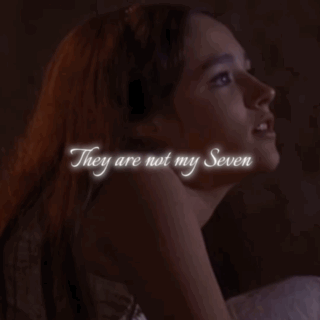

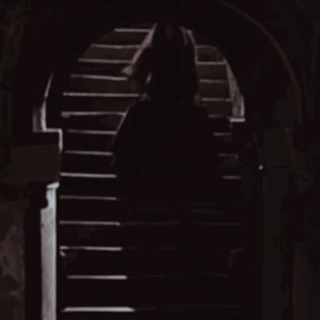
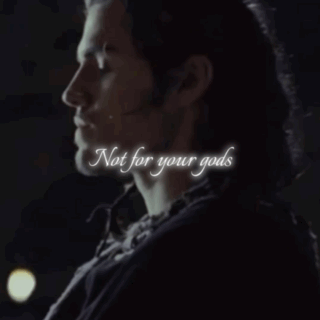
“Your Seven have a sept, Sept-Beyond- the-Sea, but only Westerosi sailors worship there.” They are not my Seven. They were my mother’s gods, and they let the Freys murder her at the Twins. She wondered whether she would find a godswood in Braavos, with a weirwood at its heart.
…all but the black-haired boy from the forge, who crossed his arms against his chest and sat glowering as the others prayed. Brienne was not the only one to notice. When the prayer was done Septon Meribald looked across the table, and said, “Do you have no love for the gods, son?” “Not for your gods.” Gendry stood abruptly. “I have work to do.” He stalked off without a bite of food. “Is there some other god he loves?”asked Hyle Hunt. “The Lord of Light,” piped one scrawny boy, nigh to six.
#Day 11: Religion & Magic#bookgendryamonth2023#arya stark#book arya stark#gendry waters#gendry#catelyn stark#lady stoneheart#ramsay snow#ramsay bolton#the hound#gendrya#book gendrya#gendryxarya#arya x gendry#asoiaf#a song of ice and fire#game of thrones
277 notes
·
View notes